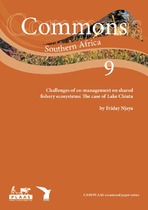| dc.description.abstract | Fisheries co-management initiatives have been implemented in various water bodies of southern Africa since the 1990s (Geheb & Sarch 2002). A Participatory Fisheries Management Programme (PFMP) was introduced on Lakes Malombe, Chilwa and Chiuta in Malawi between 1993 and 1995 (Bell & Donda 1993; Hara & Banda 1997). In Zambia and Zimbabwe, the co-management arrangement has been implemented on Lake Kariba since mid-1990s (Hachongela et al. 1998; Malasha 2003), while Mozambique and South Africa are implementing the initiative in selected areas along the coast (Lopes et al. 1998; Sowman et al. 1998). Community participation in decision-making processes regarding resource monitoring and control through formulation and enforcement of fisheries regulations is a key element in these initiatives. On the other hand, the state is involved in promulgation of a legislative framework and, in some cases, assists the user community to enforce the regulations.
The initiation process of these co-management arrangements varies from place to place. In some areas, the state initiated the co-management regimes, while in others user communities started the process. Consequently, outcomes – like equitable access to resources and cost-effectiveness – also vary.
Evaluation studies conducted on some small water bodies such as Lake Chiuta and Lake Kariba show that the user community has potential to contribute to sustainable resource management if enabling conditions are created. While most of the previous studies have centred on resource attributes, behavioural patterns and decision-making processes, very little work has focused on the implementation of co-management arrangements in shared water bodies, which is one of the complex factors (Knox & Meinzen-Dick 2001). There has been an emerging interest in transboundary natural resource management (TBNRM) initiatives since 1990, with some countries like South Africa, Malawi, Mozambique, and Botswana already advanced in creating enabling conditions (Griffin et al. 1999). However, the approach has mainly been applied to wildlife and forestry sectors.
It is against this background that this study was designed to identify some of the major challenges of implementing co-management in shared fishery ecosystems. Lessons will be drawn from Lake Chiuta, which is shared between Malawi and Mozambique. | en_US |

